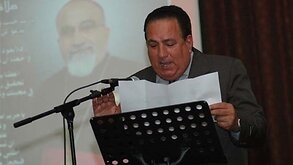The poet says that the poems of this group are the ones that chose themselves from among many poems, because of their emotional and intellectual closeness to themselves, and perhaps the thread that connects them, it blends together the individual concern and the general human concern, and reflects the feelings of love, alienation and longing for the different times of their writing.
"It is not easy for a poet to remove a poem or poems from his account, but such can happen based on objectivity, and from the poet's keenness to produce it, and the satisfaction of his readers. It is therefore natural or necessary for the poet to review what he writes from time to time," he said. It is not obligated to publish everything that he wrote or writes in a group or an office. "
The cover of the group carried a commentary written by Australian educator and poet Louise Wickling, in which she said: “In this group are deeply influential poems that embrace topics that explore the depths of sensitive experiences and the pain of exiles in the context of the ongoing global conflict. Caused by those who control the sources of strength. "
"Poetry does not have a program or planning I have, but I find myself writing it as an excuse for an internal need that wants to express itself, or an emotional state that is inevitable in response to it. The poetic soul, within it, appears outwardly, almost imperceptibly, summaries of different feelings and sensations, and many reflections of what are produced by days and their reflections on a holistic level, with a situation or reaction that mixes in its special ranges with the year. Takes the form of a poem . "
On the translation of this group into English and whether this is the first time that his poems have been translated, the poet Khaled Al-Hilli says:
"It is not the first time that Dr. Ragheed Al-Nahhas has also translated my poetry collections" Cloudy Cities "into English under the title" Your Name Is My Memory ". Arabic and English There is no doubt that these translated poems are addressed to speakers of the English language, and to young people of Arab origin who have been prevented by circumstances without their learning or proficiency in the Arabic language.
Among the poems you listen to in this meeting:
O long Iraqi sorrow
O grief that runs from one generation to the next
Why not leave us?
Why not leave us?
In another poem he says:
I told him all that you wanted to say
What still hasn't been said?
Let the lips feel the bitterness of silence
Let the eyelids settle for eyeballs.


